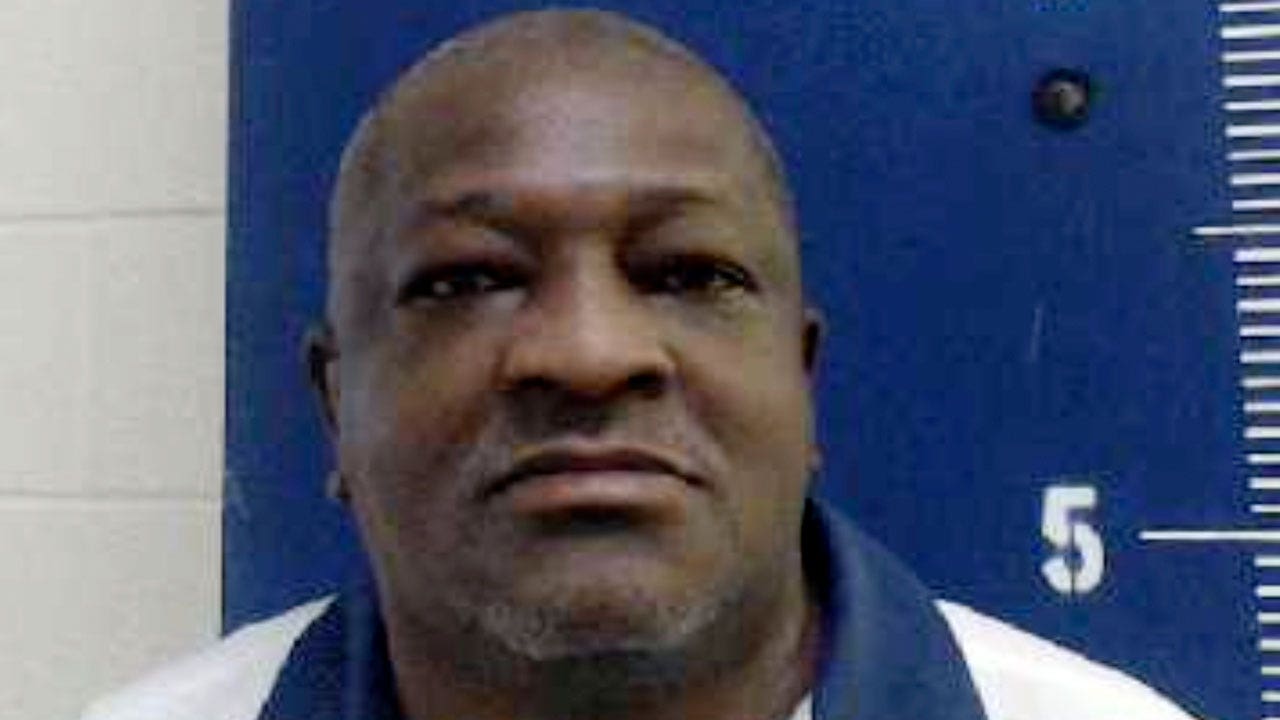Georgia
Georgia man sentenced to death seeks clemency on grounds of intellectual disability

A Georgia man should not be executed because he is intellectually disabled and feels remorse for killing his former girlfriend three decades ago, his lawyers wrote in seeking clemency for him.
Willie James Pye, 59, is scheduled to be put to death Wednesday using the sedative pentobarbital in what would be the state’s first execution in more than four years. Pye was convicted of murder and other crimes in the November 1993 killing of Alicia Lynn Yarbrough.
A clemency hearing is set for Tuesday. In Georgia, those hearings are conducted in secret, with the result announced afterward.
CALIFORNIA DEFENDANT ON TRIAL FOR MURDER ALLEGEDLY STABS HIS ATTORNEY WITH PEN, CHARGES TOWARD PROSECUTOR
“Had defense counsel not abdicated his role, the jurors would have learned that Mr. Pye is intellectually disabled and has an IQ of 68,” Pye’s public defenders wrote in their clemency application.
“They also would have learned the challenges he faced from birth — profound poverty, neglect, constant violence and chaos in his family home — foreclosed the possibility of healthy development,” they wrote. “This is precisely the kind of evidence that supports a life sentence verdict.”
Pye’s lawyers also cited severe problems in the Spalding County justice system in the 1990s and said that Pye has been a positive influence on those around him while he’s been in prison.
A judge on Feb. 29, 2024, signed the order for the execution of Willie James Pye, pictured here, who was convicted of murder and other crimes in the November 1993 killing of Alicia Lynn Yarbrough. The execution is set for March 20 at 7 p.m. (Georgia Department of Corrections via AP)
Pye had been in an on-and-off romantic relationship with Yarbrough. At the time she was killed, Yarbrough was living with another man. Pye, Chester Adams and a 15-year-old boy had planned to rob that man and bought a handgun before heading to a party in Griffin, prosecutors have said.
The trio left the party around midnight and went to the house where Yarbrough lived, finding her alone with her baby. They forced their way into the house, stole a ring and necklace from Yarbrough and took her with them when they left, leaving the baby alone, prosecutors have said.
They drove to a motel, where they took turns raping Yarbrough and then left the motel with her in the teenager’s car, prosecutors have said. They turned onto a dirt road and Pye ordered Yarbrough out of the car, made her lie face down and shot her three times, according to court filings.
Yarbrough’s body was found a few hours after she was killed. Pye, Adams and the teenager were quickly arrested. Pye and Adams denied knowing anything about Yarbrough’s death, but the teenager confessed and implicated the other two.
The teenager reached a plea agreement with prosecutors and was the main witness at Pye’s trial. A jury in June 1996 found Pye guilty of murder, kidnapping, armed robbery, rape and burglary, and sentenced him to death.
Pye’s lawyers have argued in court filings that other statements the teen made are inconsistent with what he said at Pye’s trial. Those statements, as well as statements Pye made during trial, indicate that Yarbrough left the home willingly and went to the motel to trade sex for drugs, the lawyers said in court filings.
Pye’s lawyers also wrote in court filings that Pye was raised in extreme poverty in a home without indoor plumbing or access to sufficient food, shoes or clothing. His childhood was characterized by neglect and abuse by family members who abused alcohol, his lawyers wrote.
His lawyers also argued that Pye suffered from brain damage, potentially caused by fetal alcohol syndrome, that harmed his ability to plan and control his impulses. They also argue that he is intellectually disabled and is therefore ineligible for execution, citing the findings of several experts who evaluated him.
CLICK HERE TO GET THE FOX NEWS APP
Pye’s lawyers have long argued that he should be resentenced because his trial lawyer didn’t adequately prepare for the sentencing phase of his trial. A three-judge panel of the 11th U.S. Circuit Court of Appeals agreed with Pye’s lawyers in April 2021. But the full federal appeals court overturned that ruling in October 2022.
Adams, now 55, pleaded guilty in April 1997 to charges of malice murder, kidnapping with bodily injury, armed robbery, rape and aggravated sodomy. He got five consecutive life prison sentences and remains behind bars.
Georgia’s last execution was in January 2020.

Georgia
Georgia football star Rodarius Thomas being held without bail after arrest on family violence charges

Rodarius “Rara” Thomas will be away from the Georgia football team for the foreseeable future. The Bulldogs wide receiver was suspended indefinitely after he was booked into jail around 3:20 a.m. Friday, Athens-Clarke County jail records show.
Thomas was arrested on charges of cruelty to children and battery. He is being held without bail.
Thomas’ arrest marks the latest in a string of legal issues involving various members of the powerhouse college football team over the past several months.
This week’s arrest marks Thomas’ second in the past 18 months. University of Georgia Police arrested the wide receiver in January 2023 on a felony charge of false imprisonment and a misdemeanor count of family violence battery.
CLICK HERE FOR MORE SPORTS COVERAGE ON FOXNEWS.COM
Georgia wide receiver Rara Thomas was arrested on charges of cruelty to children and battery early Friday, July 26, 2024, in Athens, Ga., adding to the team’s recent legal woes. (AP Photo/George Walker IV, File)
Those charges were later dropped when Thomas entered a pretrial diversion program. Details about Friday’s arrest were not immediately available.
Georgia Athletic Association spokesperson Steven Drummond said the situation involving Thomas “is a pending legal matter. We will have no further comment at this point.”
TWO GEORGIA FOOTBALL PLAYERS ARRESTED ON BACK-TO-BACK NIGHTS ON RECKLESS DRIVING CHARGES
Georgia football head coach Kirby Smart spoke at Southeastern Conference media days July 16 about attempts to address repeated driving offenses by his players.

A Georgia Bulldogs helmet during the fourth quarter of a game against the Missouri Tigers at Sanford Stadium Nov. 4, 2023, in Athens, Ga. (Todd Kirkland/Getty Images)
Smart said players have been suspended and fined through the collective that provides name, image and likeness (NIL) payments to the school’s athletes. Smart’s policy is to not make public announcements when players are suspended.
“I don’t necessarily think it’s right to go down to the town square and publicly shame kids,” Smart said at SEC media days earlier this month. “When that happens, they go through a lot. And there’s a lot of remorse from these young men who’ve made mistakes. But our job is to educate. Continue to grow these young men.”
A team official confirmed the suspension of Thomas.

Sanford Stadium in Athens, Ga. (Scott Cunningham/Getty Images)
The Bulldogs open the season in Atlanta Aug. 31 in a matchup with the Clemson Tigers.
Georgia players have been involved in 24 driving-related violations (DUI, reckless driving or speeding), The Atlanta-Journal Constitution has reported, including a crash that killed a player and a recruiting staffer in January 2023.
CLICK HERE TO GET THE FOX NEWS APP
Georgia offensive lineman Devin Willock and recruiting analyst Chandler LeCroy were killed in a car crash on Jan. 15, 2023, just days after the Bulldogs won the national title game.
The Associated Press contributed to this report.
Follow Fox News Digital’s sports coverage on X, and subscribe to the Fox News Sports Huddle newsletter.
Georgia
Georgia woman charged with murder after unsupervised 4-year-old boy climbs into car, dies

A Georgia woman is facing murder charges after a 4-year-old boy died inside of a car, authorities say.
On July 24, the Georgia Bureau of Investigation arrestedKelsey Monaco, 30, a Fitzgerald resident, about 154 miles west of Savannah. The Fitzgerald Police Department asked the Georgia Bureau of Investigation to look into the death of the child.
Investigators said the child left his apartment unsupervised and made his way inside of a car.
The 4-year-old was then found unresponsive inside the car. He was taken to a local hospital, where he was pronounced dead, authorities said.
Monaco was taken into custody and booked at the Ben Hill County Jail.
USA TODAY reached out to authorities to find out Monaco’s relationship to the child and if the child died because the car was hot, but we have not heard back.
‘This can’t be real’: He left his daughter alone in a hot car for hours. She died.
Georgia woman charged with murder, investigation ongoing
Monaco is currently in custody at the Ben Hill County Jail.
Arrest records show that Monaco is facing the following charges:
- 1 count, first-degree child cruelty
- 1 count, felony murder
This investigation into the 4-year-old’s death remains active and ongoing. When the investigation is complete, the case will be transferred to the Cordelle Judicial District Attorney’s Office for prosecution, authorities said.
Anyone with information is asked to contact the Fitzgerald Police Department at 229-426-5000 or the GBI Regional Investigative Office in Perry at 478-987-4545. Anonymous tips can be submitted by calling 1-800-597-TIPS (8477), online at https://gbi.georgia.gov/submit-tips-online, or by downloading the See Something, Send Something mobile app.
Ahjané Forbes is a reporter on the National Trending Team at USA TODAY. Ahjané covers breaking news, car recalls, crime, health, lottery and public policy stories. Email her at aforbes@gannett.com. Follow her on Instagram, Threads and X (Twitter) @forbesfineest.
Georgia
CDC officials warning about rising dengue fever cases in Georgia

The Atlanta-based Centers for Disease Control and Prevention are reporting a growing number of cases of dengue fever infections in Georgia.
The agency says the disease is the most common mosquito-borne infection worldwide.
There have been almost 2,900 cases of the viral infection in the United States so far in 2024 – nearly as many as were reported in all of 2023. The CDC says there has also been a record number of cases worldwide.
In Georgia, there have been 20 reported cases – up from 16 earlier in July.
What is dengue?
Spread by mosquitoes, most cases of dengue in the United States are associated with travel to areas like the Virgin Islands, Puerto Rico, or other areas with high risk for tourists.
The CDC says most people never know if they have dengue because of a lack of symptoms.
For the 1 in 4 people who do feel sick after becoming infected, symptoms include fever, headache, skin itching and rash, vomiting, and muscle and joint pains.
In rare cases, people may get severe dengue, a medical emergency that can quickly get worse. Symptoms of this include belly pain, persistent vomiting, a bleeding nose or gums, and vomiting blood.
If you have any symptoms, talk to your doctor and share your recent travel history.
-

 World1 week ago
World1 week agoOne dead after car crashes into restaurant in Paris
-

 Midwest1 week ago
Midwest1 week agoMichigan rep posts video response to Stephen Colbert's joke about his RNC speech: 'Touché'
-

 News1 week ago
News1 week agoVideo: Young Republicans on Why Their Party Isn’t Reaching Gen Z (And What They Can Do About It)
-

 Movie Reviews1 week ago
Movie Reviews1 week agoMovie Review: A new generation drives into the storm in rousing ‘Twisters’
-

 Politics1 week ago
Politics1 week agoFox News Politics: The Call is Coming from Inside the House
-

 News1 week ago
News1 week agoIn Milwaukee, Black Voters Struggle to Find a Home With Either Party
-

 News1 week ago
News1 week agoVideo: J.D. Vance Accepts Vice-Presidential Nomination
-

 World1 week ago
World1 week agoTrump to take RNC stage for first speech since assassination attempt
















